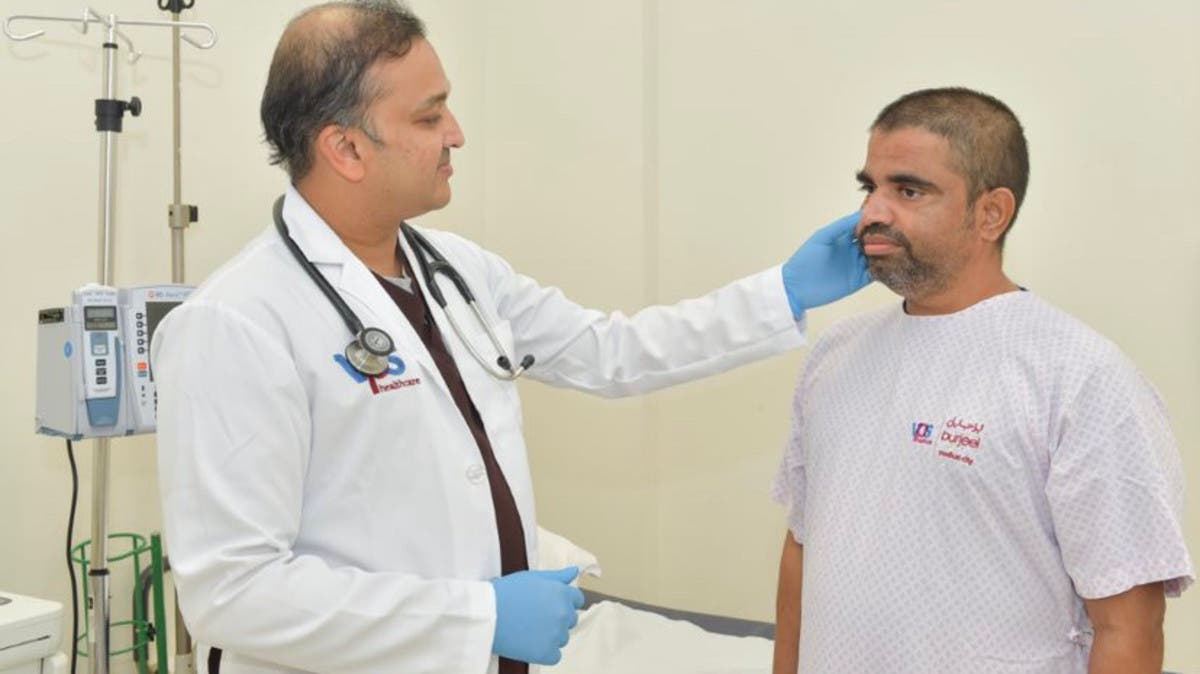An Indian expatriate has beaten a rare and deadly bacterial infection after struggling between life and death for 54 days in a private hospital in the United Arab Emirates.
Nitesh Sadanand Madgaocar, a 42-year-old driver from the Indian state of Goa, was diagnosed with cepacia syndrome – a bacterial infection with a high mortality rate of 75 percent.
For all the latest headlines follow our Google News channel online or via the app.
Cepacia syndrome is a fatal condition affecting the respiratory system combined with multiple organ failures.
Presented with critical COVID-19 symptoms
A resident of the UAE for 27 years, Nitesh had returned to Abu Dhabi after a vacation in the last week of August. He developed fever and weakness while quarantining in his room in Musaffah.
On August 28, two days after the onset of fever, his condition worsened. Nitesh called up his employer, who took him to Burjeel Medical City, a quaternary care hospital at Mohammed Bin Zayed City in Musaffah.
At the emergency department, Nitesh reported having high fever, fatigue, pain in the joints, shortness of breath, and loss of smell and appetite.
Upon medical evaluation, he was found to be diabetic and had pneumonia. His inflammatory markers were high, and he had tachycardia (faster heart rates) and crepitation (explosive sounds) in both lungs.
He was immediately admitted to ICU as his oxygen saturation level was critically low. Put on high flow nasal oxygen, he was administered intravenous antibiotics by the doctors to treat pneumonia.
Initially, Nitesh had responded well to medicines and started showing signs of recovery. It had been a week, and the doctors were to shift him to room when his condition worsened again.
Nitesh developed a high fever and tachycardia and had to continue in the ICU for few more days.
Diagnosis of cepacia syndrome
Nitesh was shifted to room care on the second week of September as his condition improved following the treatment. While he was recuperating in the ward, abscesses started surfacing on his skin and joints. The first abscess had developed on the medial portion of his left knee, from which the doctors drained 90 ml of fluid.
Later, abscesses surfaced on different parts of Nitesh’s body, and he developed effusion in the left knee. His health started to deteriorate, and the inflammatory markers went up again. He developed acute respiratory distress, and there were multiple cavitary lesions and septic emboli (blood clots) in the lungs. He also developed abscesses in the liver in both the lobes. He deteriorated considerably and had to be shifted to ICU again.
The culture reports from multiple abscesses found a rare bacterium, ‘Burkholderia cepacia’, and he was diagnosed to be having a rare cepacia syndrome.
In the ICU for a month
Shifted to the ICU, a multi-disciplinary team of doctors analyzed his reports and health condition. Dr. Niyas Khalid, Specialist Internal Medicine at Burjeel Medical City, led the team of doctors with Dr. Georgey Koshy, the Medical Director of the hospital.
“The team designed the treatment protocol and administered Nitesh double IV antibiotics, along with inhalational and antifungal antibiotics and steroids. It took four weeks for him to get better,” said Dr. Niyas, who diagnosed the case.
After a few days in the ICU, Nitesh’s reports showed that his health had improved. The lesions in the lungs and abscesses in the liver had disappeared.
Speaking on the case, Dr. Koshy said: “Nitesh’s was a highly complicated case. Any delay in diagnosing the case would have cost a life. God has been great and kind to all of us. Nitesh recovered completely, and he is healthy and fit.”
Thankful to doctors
It took 54 days for Nitesh to beat the rare and deadly bacterial infection.
“I am grateful to God and the doctors at Burjeel Medical City for this second life. When I fell ill, I had hardly thought that it was so serious. By the time I reached the hospital, my health had deteriorated considerably. I would not have come back to life if the doctors had not treated me well. They are like God to me. My family and I will always remember them in our prayers for our lifetime,” said Nitesh.
It was a tough time for his family in India also. Nitesh had informed about his condition only to his wife. “She was scared and praying all the time for my recovery. I had asked her not to share the news with my mother as she would panic. So, my wife has to bear the pain all by herself,” said Nitesh, who has a four-year-old daughter.
Rare in immunocompetent individuals
It is not sure how had Nitesh contracted the disease. Cepacia syndrome usually affects immunocompromised individuals like those having cystic fibrosis.
However, Nitesh was lucky as he was immunocompetent and was not on any immune suppressant drugs or therapy, said Dr. Niyas, adding that proper diagnosis and effective treatment have saved his life.
Read more:
Seven-year-old boy dies of rare brain-eating infection in US
Here are 10 deadly diseases that vaccines helped bring under control
As the UAE’s COVID-19 cases plummet, vaccination centers fall silent

 World2 years ago
World2 years ago
 World2 years ago
World2 years ago
 Entertainment7 years ago
Entertainment7 years ago
 World7 years ago
World7 years ago
 Entertainment7 years ago
Entertainment7 years ago






